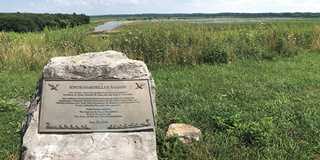Family Honor
The Marsellus family plays an important role in developing on-the-ground partnerships for projects and programs that benefit a crown jewel of New York wetlands, Montezuma National Wildlife Refuge
The Marsellus family plays an important role in developing on-the-ground partnerships for projects and programs that benefit a crown jewel of New York wetlands, Montezuma National Wildlife Refuge
I want to honor my grandfather and father, says John D. Marsellus. So begins an enlightening conversation about a remarkable family history that started in Ducks Unlimiteds early years.
Johns connection to DU began the day he was born, in 1939, when his grandfather, John C. Marsellus, made a phone call to the organization, then headquartered in New York City. He informed the office that a contribution of five dollars was on its way for a five-year Ducks Unlimited membership for his new grandson. Eighty-one years later, Johns membership has never lapsed.
In 1872, his great-grandfather, John Marsellus, started the Marsellus Casket Company beside the Erie Canal in Syracuse, New York. He built a business known across the nation for quality and commitment to its employees and community. Four US presidents and dozens of celebrities and sports figures have been laid to rest in Marsellus caskets.
A commitment to conservation began with the second generation of the family. John C. Marsellus had a passion for waterfowling and the evolving science of game-bird management. The need for decisive and visionary leadership in the early conservation movement pioneered by Aldo Leopold married well with his interests. Ducks Unlimited, which then had only a handful of members and state committees, offered the perfect opportunity for him to make a difference. He served as an early state committee chair and later as a national trustee for the fledgling organization.

Major Sponsor John D. Marsellus comes from a long line of conservation supporters. His gifts to DU have benefited wetlands on the Montezuma National Wildlife Refuge Wetlands Complex, which are some of New York's most important wildlife habitats. The refuge's Knox-Marsellus Marsh was dedicated to the late John C. Marseullus and his fellow Major Sponsors, Northrup R. Knox and Seymour H. Knox III, in 2001.
Today, the Marsellus family plays an important role in developing on-the-ground partnerships for projects and programs that benefit a crown jewel of New York wetlands, Montezuma National Wildlife Refuge. Partnerships with the US Fish and Wildlife Service, New York State Department of Environmental Conservation, and others have led to extensive and ongoing restoration of marginal farmlands into functioning wetland complexes. These projects, along with the successful implementation of biological control programs developed by Cornell University, have eradicated over 90 percent of the invasive purple loosestrife that once choked the refuge. Together, these efforts have restored crucial wetlands to healthy, functioning natural systems that host tens of thousands of migrating waterfowl, raptors, shorebirds, and other avian species each year.
The Marsellus familys support and encouragement of partnerships has led to amazing accomplishments, says Sarah Fleming, DUs director of conservation programs for the northeastern United States. The Montezuma conservation partners are a vibrant community of organizations and volunteers who support wetland management and understand the role it plays for water quality and wildlife resources.
Programs for youth at the refuge and the extraordinary interactive display at the Montezuma Audubon Center, the result of a partnership with the Audubon Society, provide educational opportunities that showcase the ecological benefits of wetlands to thousands of visitors each year. The Marsellus family also has a strong association with the State University of New York and its College of Environmental Science and Forestry, among the nations oldest and most distinguished institutions focused on the study of the environment, with the goal of ensuring that future conservation leaders continue to receive bachelors and masters degrees in environmental sciences at the college.
We are fortunate to have such solid supporters, says DU Director of Development Ron Zega Jr. The Marsellus family uses their important history to continue to make an impact today.
Ducks Unlimited uses cookies to enhance your browsing experience, optimize site functionality, analyze traffic, and deliver personalized advertising through third parties. By continuing to use this site, you agree to our use of cookies. View Privacy Policy